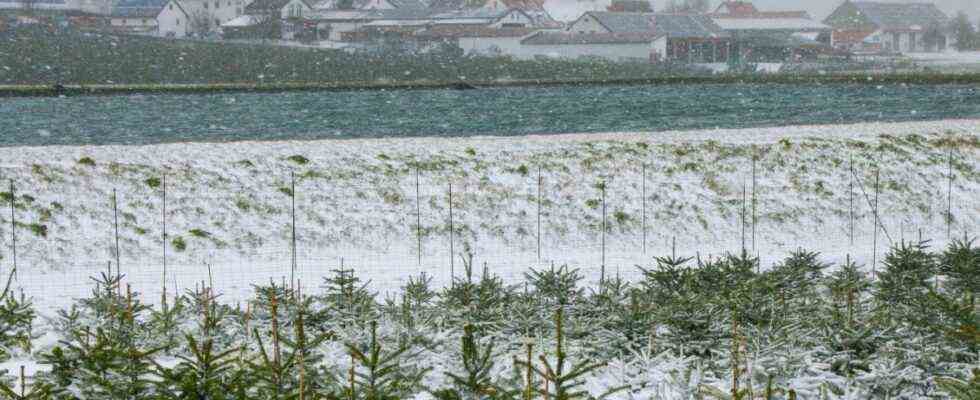The supply of clean drinking water is a matter of course for most of the residents in the Dachau district. In fact, its quality is very high – still. Nitrate pollution varies in the individual areas, but is in the single-digit range and thus well below the EU limit of 50 milligrams per liter. However, experts warn of the long-term effects of nitrate input from agriculture on groundwater and the consequences of climate change. Against this background, the Munich Administrative Court is negotiating on December 14th the lawsuit brought by an entrepreneur from the Hebertshausen community against the Dachau district. The court has to decide: In this case, does the protection of the groundwater or the economic interests of the plaintiff have more weight?
In 2016, farmer Stefan Spennesberger applied to the District Office to build a well for his 22 hectare Tannenhof Oberweilbach. While the approval process was still in progress, he began with the new building. That was also legal, as Sina Török, press spokeswoman for the district office, explains. “He can start drilling, but not as far as the deep groundwater.” But then the bitter end: The authorities have now ordered the dismantling of the unapproved well for growing Christmas trees. The reason: it reaches too deep and endangers the drinking water supply. The water management authority was also involved in the test procedure.
The required removal of the well would be a “catastrophe” for its operation.
Water experts speak of three floors of groundwater in the ground, which are separated from each other by impermeable rock: the deep groundwater in the lower tertiary layer, which should be reserved for future generations as a drinking water reservoir; the water in the upper tertiary layer, from which today most of the drinking water, 90 percent in Bavaria, is taken, and the groundwater in the layer above, the quaternary layer, from which only water for agricultural use should and may be pumped.
But Spennesberger’s well extends deeper and therefore influences the drinking water supply, says Török. The press spokeswoman emphasizes that her authority does not impose an intention on the farmer or the construction company. She even admits that the well is in an area in which there is practically no Quaternary layer. Farmer Spennesberger did not want to comment because, as he says, it is an ongoing procedure. Only this much: the required removal of the well would be a “catastrophe” for its operation.
The court hearing takes place against the background of an environmental policy debate on the protection of drinking water, which was initiated by the Greens in the district assembly in March 2019. Because of climate change, conflicts of interest between agricultural irrigation and drinking water supply would increasingly arise, said the parliamentary group spokeswoman Marese Hoffmann. In fact, it is not always possible to use surface water or stored rainwater for irrigation, which is why groundwater has to be used. The Greens wanted to know from the administration the technical basis of the approval in such cases.
District Administrator Stefan Löwl (CSU) answered the questions online in the Citizens’ Dialogue forum. The district office and the representatives of agricultural interests would rate the groundwater as “the highest good that should be strictly protected and primarily reserved for the public drinking water supply”. Due to climate change and the more frequent dry phases associated with it, however, more use is being made of groundwater wells in agriculture. Use of the deep groundwater is only permitted in exceptional cases and subject to strict conditions. For example, there must be no risk of contamination.
A less than satisfactory answer for the Greens and the federal nature conservation in the district. Questions remain. It is true that the nitrate pollution of the groundwater and drinking water is far below the EU limit value. “The Dachau drinking water is very good, even one of the best in Bavaria,” says press spokeswoman Török. In order for it to stay that way, the groundwater must be protected. According to the Bavarian Ministry of Agriculture, there are individual fields along the northern border of the district, via Altomünster and Hilgertshausen-Tandern, into the neighboring districts of Neuburg-Schrobenhausen and Pfaffenhofen, under which the groundwater is too highly polluted with nitrate. Excessive nitrate pollution in the water can be carcinogenic. Therefore, affected farmers have to follow strict conditions. Above all, they have to reduce the amount of fertilizer they use, which is the main reason for nitrate contamination, by 20 percent. It provides for a tightening of the fertilizer ordinance, which has been in force for one and a half years. But the farmers doubt the results of the measurements by the authorities.
The deep groundwater should be conserved
Green district councilor Roderich Zauscher, chairman of the Federal Nature Conservation Union, thinks that the nitrate input in the district is kept within limits, since the intensive livestock farming with its high levels of fertilizer (manure, liquid manure) does not have the same extent as in other parts of the country. Nevertheless, he warns: A massive nitrate input from the intensive fertilization of arable land could only become noticeable in the groundwater over the years. The situation is different with soils, rivers and near-surface water. The water from house wells in the gardens, for example, comes from a shallow depth and is polluted with nitrate and pesticides.
The pollution of the near-surface groundwater – the main source of drinking water in Bavaria – is increasing. According to the Ministry of the Environment, around 30 percent of the groundwater bodies are contaminated with residues from agriculture. The deep groundwater should be conserved, the water suppliers should treat contaminated groundwater with filter systems. According to the Federal Environment Agency, a person in Germany consumes 120 liters of clean water a day – climate change could make this a luxury that is no longer affordable. Because little precipitation and persistent periods of drought slow down the formation of new groundwater.

